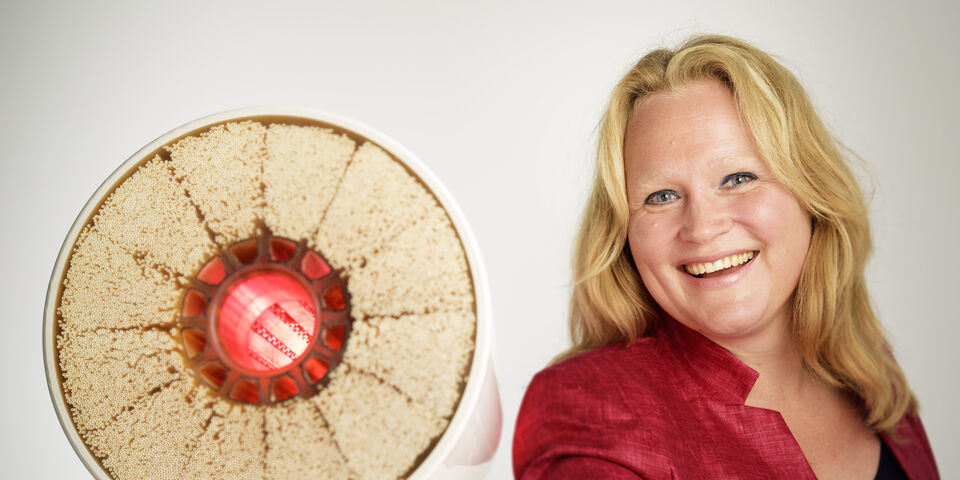The magic of membranes
The Department of Chemical Engineering and Chemistry has a new research group: Membrane Materials and Processes. Under the guidance of Professor Kitty Nijmeijer this group is going to develop membranes to retrieve precious substances from waste streams. The membrane expert, who has come over from Twente, is now fully occupied with the setup of a brand-new laboratory.
A membrane is a thin film, which does allow some substances to penetrate while blocking others. Our body contains many membranes: our lungs for instance, or the wall of our intestines. Indeed, every cell in our body is surrounded by a membrane. The purpose of all these biological membranes is selectively to block certain substances or to allow them to pass: they work like a filter. Apart from this, you can make artificial membranes that have filtering properties - these are often made of polymers (plastic).
What is special about Nijmeijer’s group is that they can make membranes themselves. “Whilst more research is being conducted into membranes worldwide, that often boils down to testing them. We are taking things one step further, trying to influence the properties of membranes by means of specific materials and processes, in such a way that they allow you to separate specific substances.
In order to do so in Eindhoven as well, her lab will in the next few months be fitted with equipment to ’spin’ membranes with a variable composition and structure from a polymer solution. She will also have measuring equipment to determine things like the pore size, the water permeability and the separating properties of the membranes produced. “We are also having a device made that enables us to test membranes for the separation of gases, for instance to remove the greenhouse gas CO2. By means of that device we can also measure carbon monoxide and hydrogen sulfide. These are hazardous substances that are present in many industrial gas flows and that have a great impact on the functioning of polymer membranes. As far as I know, we will be the first ones in the world who will be able to measure that effect well.”
In many chemical production processes the baby is thrown out with the bathwater, as it were, because it is not yet profitable to retrieve precious substances from the waste stream. According to Nijmeijer there is a world to be won with membranes in this respect. “I want to see how we can adapt membranes in such a way that we can get certain minerals out of that water for reuse, or how we can retrieve proteins, for example, from streams in the dairy industry.”
For the time being the scientific staff of MM/P will be formed by Nijmeijer and Associate Professor Zandrie Borneman, who has also come over from Twente. In Eindhoven Borneman is going to set up a membrane institute affiliated with MM/P, which carries out contract research for the business community. “Before long two technicians will be starting in our group who will carry out that contract research, in addition to supporting PhD candidates and other researchers. That will generate technicians with vast expertise who can recoup part of their own salaries. Besides, in this way you can keep a close eye on the needs of the business community and the rest of society.”


Discussion